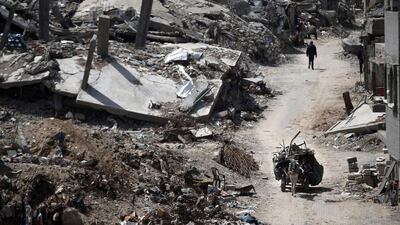In recent days, 100-year-old black-and-white images of women carrying infants through the desert have flashed up on the screens of news channels. The images are followed by more recent footage of similar head-scarfed women fleeing with their babies across the sand. The first images are shots of the expulsion of Armenians from eastern Turkey in 1915 during which up to 1.5 million were killed or died of hunger and thirst. The modern footage is of Yazidi families fleeing the onslaught of ISIL in Iraq last year.
Is it fair to put these two events side by side on screen, given the power of images to suggest a continuum of oppression of religious and ethnic minorities from the First World War to today? The question will be hard to escape over the next week. Foreshadowing the 100th anniversary of the start of the Armenian deportations on April 24, Pope Francis lit the fuse for an explosive debate by describing the Armenian massacres "the first genocide of the 20th century".
The pope is used to poking sticks into hornet’s nests. The Vatican diplomatic service cannot have failed to be aware of the likely reaction in Turkey, a country recently visited by Francis and one where the Roman Catholic hierarchy has invested much effort in good relations. Turkey recalled its ambassador from the Vatican in protest. On Wednesday, the European Parliament passed a resolution urging Turkey to recognise the events of 1915 as genocide. The Turkish President, Recep Tayyip Erdogan, responded angrily: “The stain of genocide on our nation is out of the question.”
This is not the place to rehearse the arguments on both sides, which have been aired in these pages, including by the Turkish ambassador today. Under Mr Erdogan the taboo on discussion of the massacres has been lifted, and he himself has expressed condolences to the Armenian victims. But there is adamant refusal to accept the term genocide even though the term is supported by many scholars.
The issue for the Turks is the context of these terrible events. They took place during a war that caused industrial scale casualties and against the background of the decades-long collapse of the Ottoman Empire during which millions of Muslims died and were forced out of their homes. The Armenians were far from the only victims.
The list of countries where genocide has been ruled by international courts to have taken place usually includes Nazi Germany and Rwanda, and in Bosnia at the hands of the Bosnian Serbs. But the powerful countries escape. Was not Russia guilty of genocide by deporting the Circassian Muslims in the 1860s from their homeland in the Caucasus, land where the Sochi winter Olympics were held? And what about Stalin’s treatment of the Muslim Chechens, deported en masse from their homes in 1944 and left to die on the steppes of Kazakhstan? And shouldn’t the European settlers in America be deemed guilty of genocide for their destruction of the native peoples?
Americans would argue that this argument is ridiculous. After all, that was in the past. But when did the past stop and the present begin? Perhaps the line should be drawn from 1948 when the Convention on the Prevention and Punishment of the Crime of Genocide was adopted by the UN General Assembly.
No one can deny that battles over other people’s history are deeply attractive to the media and to legislatures looking for an easy vote. It is much easier for the European Parliament to approve a motion on 1915 than to tackle the tragedy unfolding in the Mediterranean, where thousands – Syrians, Eritreans and others – are likely to drown in leaky boats over the summer trying to reach Europe from Africa. There are no easy solutions there.
A visitor from Mars would be shocked that countries are arguing over events a century ago while a real humanitarian crisis is unfolding along Turkey’s southern border.
Some 40 to 50 million people around the world have been forced to leave their homes by war, civil unrest or climate stress. What to do about these people and the wars that have ruined their lives is the real issue of our time. Who, for example, has found a way to help the 16,000 remaining residents of the Yarmouk Palestinian refugee camp on the outskirts of Damascus, besieged and bombed by government forces and then laid waste by ISIL? The UN secretary general, Ban Ki-moon, made a desperate plea for outside intervention, describing Yarmouk as the “deepest circle of hell”. There was not much response either from Arab states or the outside powers.
Here lies the answer to why Pope Francis threw caution to the wind last Sunday. It is not about redress for events 100 years ago. It is about the future of the Christians in the Middle East at a time of unprecedented war and dislocation. In the past, the Vatican has spoken softly in defence of Christians in the region, aware that their position as integral parts of their communities is undermined if they appear to have colonial protectors. To put things in context again, ISIL has killed many more Muslims than Christians or Yazidis.
That policy has not worked. Continuing war in Syria is hastening the exodus of Christians from the region. If the pope took his gloves off with Turkey, it is because of Mr Erdogan’s role in the Syrian conflict, where he has given priority to toppling Bashar Al Assad over containing the jihadists of ISIL. The Vatican sees things differently – the triumph of ISIL would be a catastrophe.
Raising the Armenian issue is a stick to beat Mr Erdogan with. But whether the western world has the right to give morality lessons in a region where its intervention has caused so much pain and bitterness is an open question.
Alan Philps is a commentator on global affairs
On Twitter @aphilps

